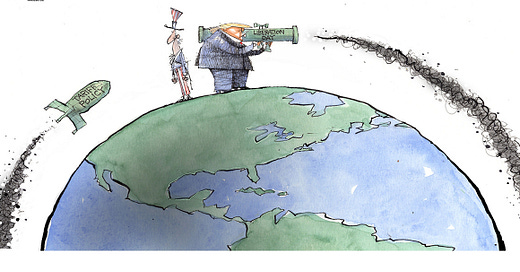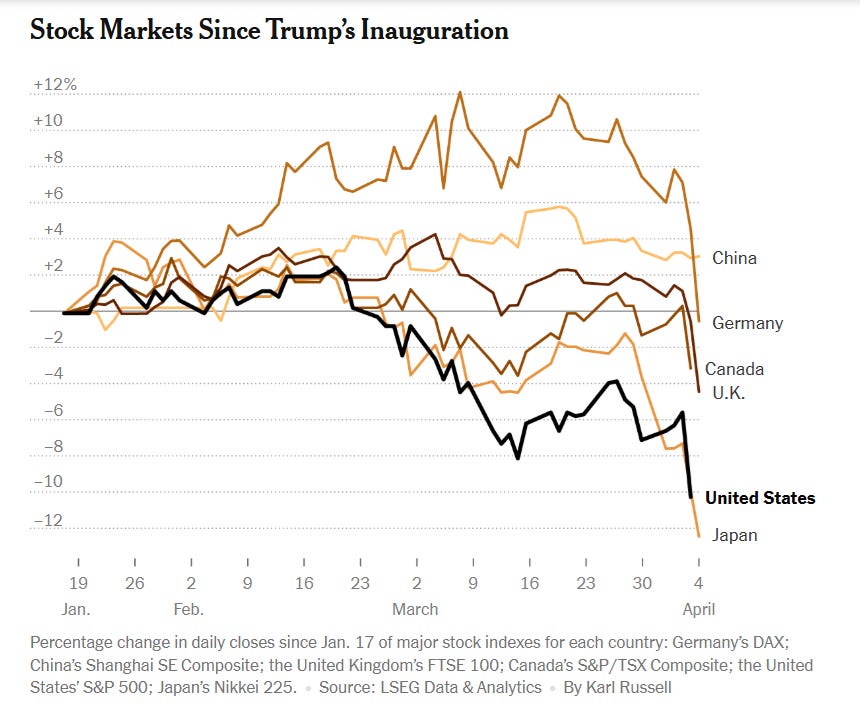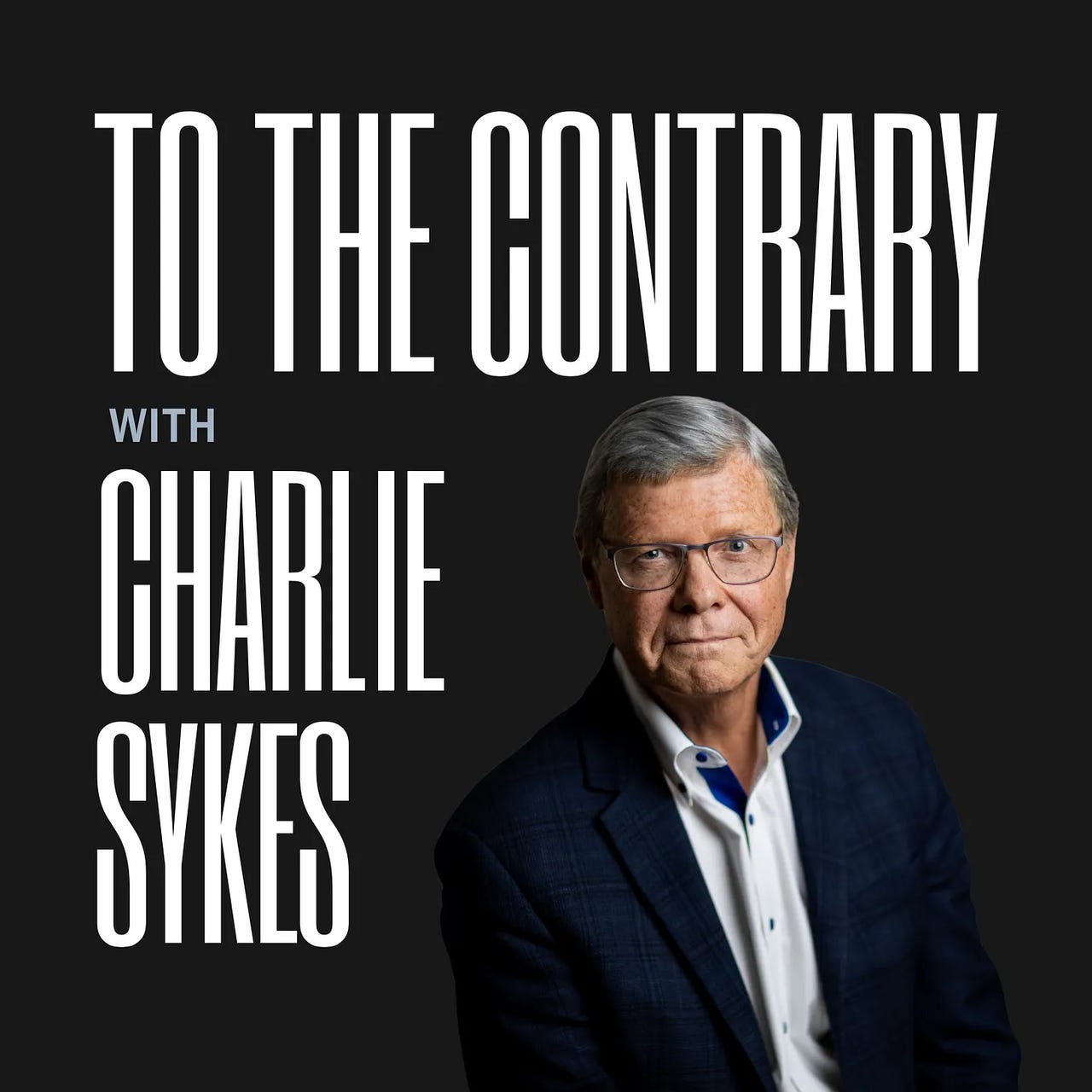“The real economic story of the past three decades is that the United States has surged ahead of all its major competitors. In 2008, the U.S. economy was about the same size as the euro zone’s; now, it is nearly twice the size. In 1990, average U.S. wages were about 20 percent greater than the overall average in the advanced industrial world; they are now about 40 percent higher. In 1995, a Japanese person was 50 percent richer than an American in terms of GDP per capita; today, an American is about 150 percent richer than a Japanese person. In fact, the poorest American state, Mississippi, has a higher per capita GDP than Britain, France or Japan…. Since Trump first took office in 2017, the United States has abandoned virtually all efforts to expand trade. But other countries have picked up the slack. The European Union has signed eight new trade deals, and China has signed nine. As Ruchir Sharma, the chair of Rockefeller International, notes, ‘Of the 10 fastest-growing trade corridors, five have one terminus in China; only two have a terminus in the U.S.’ Countries around the world need growth, and that means trade. China will clearly be the big winner in this new world economy because it will position itself as the new center of trade. Add to this Trump’s hostility toward America’s closest allies, and you will likely see Europe, Canada and even some of America’s Asian allies find a way to work with China.” ~ Fareed Zakaria
The following articles represented only a sampling of the commentary on Trump’s so-called Liberation Day. If you want to read more, just google: tariff debacle.
As I pointed out in my Economic chutzpah post from last month, Trump doesn’t have much of a track record of being an economic genius or even a decent businessman. The Dunning–Kruger effect is alive and well in the Oval Office. (Although actually, I think he’s playing golf in Florida today.)
So there is little more I can add about Liberation Day, except that I’m watching my savings being liberated from my retirement account due to the despotic recklessness, malice and sheer idiocy of this incompetent moron.
What more is there to say?
…what are the odds that Trump can get all of these complex issues right — based on trusting his gut — when on the same day that he was announcing his huge tariff increases on imports from the world over, he invited into the Oval Office Laura Loomer, a conspiracy theorist who believes that Sept. 11 was an “inside” job. She was there to lecture Trump about how disloyal key members of the National Security Council staff were. Trump subsequently fired at least six of them.
Yes, what are the odds that such a president, seemingly ready to act on foreign policy on the advice of a conspiracy theorist, got all this trade theory right? I’d say they’re long.
We cannot overstate what has just happened. It took just 71 days for Donald Trump to wreck the American economy, mortally wound NATO, and destroy the American-led world order. He did this with the enthusiastic support of the entire Republican party and conservative movement. He did it with the support of a plurality of American voters.
He did not hide his intentions. He campaigned on them. He made them the central thrust of his election. He told Americans that he would betray our allies and give up our leadership position in the world.
There are only three possible explanations as to why Americans voted for this man:
they wanted what he promised;
they didn’t believe what he promised; or
they didn’t understand what he promised.
Pick whichever rationale you want, because it doesn’t matter. Whatever the reason was, it exposed half of the electorate—the 77 million people who voted for Trump—as either fundamentally unserious, decadent, or weak.
And no empire can survive the degeneration of its people.
Trump’s Trade War Risks Forfeiting America’s Economic Primacy
The global economic system that the United States has shaped and steered for more than three-quarters of a century was animated by a powerful guiding vision: that trade and finance would be based on cooperation and consent rather than coercion.
That system, for all its faults, entrenched the United States as the world’s richest nation and its sole financial superpower. The rule of law and the stability and trust that this approach generated helped make the dollar the world’s go-to currency for transactions and America a center of global investment.
By provoking a worldwide trade war, President Trump risks abandoning that vision of shared interests and replacing it with one that assumes sharp economic conflicts are unavoidable.
But what if it isn’t just a plan (no matter how bonkers) to make America richer? What if it is actually about amassing more power? Just as universities and law firms have recently done, this could be about Trump forcing private industry, key institutions, and foreign governments to bend the knee.
There Is Only One Way to Make Sense of the Tariffs
If there’s anything worse than an economic plan that attempts to revive the 19th-century protectionist U.S. economy, it’s the fact that the people responsible for explaining and implementing it don’t seem to have any idea what they’re doing, or why…
By the numbers, the tariffs are less an expression of economic theory and more a Dadaist art piece about the meaninglessness of expertise. The Trump administration slapped 10 percent tariffs on Heard Island and McDonalds Islands, which are uninhabited, and on the British Indian Ocean Territory, whose residents are mostly American and British military service members. One of the highest tariff rates, 50 percent, was imposed on the African nation of Lesotho, whose average citizen earns less than $5 a day. Why? Because the administration’s formula for supposedly “reciprocal” tariff rates apparently has nothing to do with tariffs.
How Trump’s latest tariffs could affect your wallet
Trump has argued tariffs will protect U.S. industries from unfair foreign competition and raise money for the federal government. But since so much of what we buy today relies on a global supply chain, steeper tariffs mean you’ll likely see more expensive prices from the grocery aisle to your next car repair.
Your Life Will Never Be the Same After These Tariffs
These tariffs are going to hurt. A lot. By my calculations, this round of tariffs may be 50 times as painful as the ones Donald Trump instituted in his first term. That means they are going to reshape your life in much more fundamental ways.
“He believes in walls…”
Trump and his allies hint at economic pain ahead for Americans
While Trump and top administration officials have framed any economic pain from their policies as short-term hits that are necessary to improve the economy in the long run, their comments go against the optimistic, fast-fix rhetoric Trump deployed on the campaign trail. Trump said in August that on his first day in office he would “end inflation and make America affordable again,” and he denied that tariffs would raise prices for consumers.
These Tariffs Are a Democratic Crisis, Not Just an Economic One
Since the end of World War II, freer trade has catalyzed the greatest reduction of poverty in human history. In America and around the globe, wherever leaders have embraced markets, economic liberalization has raised life expectancy, lowered infant mortality, and created pathways to prosperity. No economic policy in the modern era has done more to improve the condition of humanity than the deliberate opening of markets, not through conquest, but through peaceful cooperation and voluntary exchange.
That’s why I’m baffled by the idea that tariffs are a pathway to renewal.
Trump Has Already Botched His Own Bad Tariff Plan
The key to making it work was to convince businesses that the new arrangement is durable. Nobody is going to invest in building new factories in the United States to create goods that until last week could be imported more cheaply unless they’re certain that the tariffs making the domestic version more competitive will stay in place….Indeed, precisely two hours and 17 minutes after insisting that his policies would never change, Trump returned to Truth Social to announce excitedly that the policies were going to change:
Behind the Curtain: You gotta believe
For Trump to be right, you gotta believe...
That Trump's instincts are better than the past half-century of his party's judgment, as well as the judgment of the economists who've studied the topic extensively, both historically and contemporaneously.
That Sen. Mitch McConnell (R-Ky.) — the former majority leader, reflecting what the vast majority of Senate Republicans say privately — was wrong when he tweeted: "As I have always warned, tariffs are bad policy, and trade wars with our partners hurt working people most. Tariffs drive up the cost of goods and services. They are a tax on everyday working Americans."
That a minimum 10% increase in taxes on all imports — and much higher taxes on goods that come from China, Vietnam and other leading trade partners — won't meaningfully increase prices for most Americans.
That U.S. companies will be able to make the same products just as cheaply — and right away.
That allies and adversaries hit with big tariffs will just suck it up rather than retaliate, or that they'll move en masse to negotiate new trade deals favorable to the U.S.
That American influence and power overseas won't diminish when those same allies start doing more business with each other — or China.
That Canadian Prime Minister Mark Carney was wrong when he said: "Our old relationship of steadily deepening integration with the United States is over. The 80-year period when the United States embraced the mantle of global economic leadership ... is over. While this is a tragedy, it is also the new reality."
That the U.S. stock market and economic growth will rise again amid a global trade war of choice.
That recession forecasts by major financial institutions are wrong. And that the Dow, S&P and NASDAQ (U.S. stocks off $3 trillion Thursday — the biggest one-day drop since March 2020) are all wrong — or wildly overreacting.
Where Fools Rush In: Trump's Tariff Proposals
I'll venture the opinion that Trump's trade policy is the economic equivalent of George W. Bush's invasion of Iraq. It bodes disaster….
The imposition of high tariffs (beyond the 10 percent) on a host of countries with which we had formerly enjoyed good relations, and which have not contributed to the international imbalance in trade surpluses could very well precipitate a global downturn; and it could isolate the United States economically and open the door for the Chinese to peel away trade partners. It could land a final blow to our diplomatic and military alliances.
But rather than fixing the rules that some U.S. trading partners took advantage of, Trump has chosen to blow up the entire system. He has taken the hatchet to trade with practically every major U.S. trading partner, sparing neither allies nor rivals. China now faces high tariffs, yes, but so do Japan, South Korea, and Taiwan. Long-standing, mutually beneficial economic relationships and geopolitical alliances have counted for little.
Many people hope that Trump’s tariffs will prove ephemeral—that, confronted with tanking stocks and rising prices, Washington will roll the restrictions back. It is possible that the White House will lower some of its rates, especially as countries lobby for exemptions. But the reality is that the age of free trade is unlikely to come back. Instead, any haggling between Trump and other states will shape an emerging economic system defined by protectionism, tensions, and transactions. The result will not be more jobs, as Trump has pledged. It will be turbulence for all, and for years to come.
“It’s now clear that the Administration computed reciprocal tariffs without using tariff data. This is to economics what creationism is to biology, astrology is to astronomy, or RFK thought is to vaccine science. The Trump tariff policy makes little sense EVEN if you believe in protectionist mercantilist economics.”
~ Lawrence Summers
The Job Market Has Been Resilient. The Trade War Could Be Its Undoing.
For three years, the U.S. economy has been buffeted by rapid inflation, high interest rates and political instability at home and abroad. Yet it has proved surprisingly resilient, supported by the sturdy pillars of robust consumer spending, a rising stock market, and healthy balance sheets for households and businesses alike.
But one by one, those pillars have begun to crack under the weight of tariffs and uncertainty. The all-out global trade war that President Trump declared on Wednesday could be enough to shatter what had arguably been the economy’s final source of support, the strong job market.
Trump’s Tariffs Are Designed to Backfire
According to President Donald Trump, April 2, 2025—the day he unveiled his executive order implementing global tariffs—will be remembered as a turning point in American history. He might be right. Unfortunately, April 2 is more likely to be remembered as a fiasco—alongside October 24, 1929 (the stock-market crash that kicked off the Great Depression), and September 15, 2008 (the collapse of Lehman Brothers)—than as the beginning of a new era of American prosperity.
The Demolition of a Welcoming World
Being American was seen as honorable. Being American meant being free, open, democratic, generous. There was a kind of immunity it provided to live in the post-World War II world, emanating in part from the valiant role of America in helping defeat Hitler and the Nazis and helping save our democratic allies from the fascist menace. The Marshall Plan and the bright, youthful energy of John F. Kennedy later extended that dividend.
We can talk about Nixon and the Vietnam War, the arrogance of Ronald Reagan and the deadly ugliness of George W. Bush’s attacks on Iraq and Afghanistan, all tearing away at that positive picture of what it means to be American.
But Donald Trump’s grievance-fueled attacks on American allies and neighbors—Canada, Mexico, Greenland, Denmark, Panama, Germany, the European Union, NATO—have shown the world that this country is no longer a reliable partner. Those who we once knew were our friends and allies have been forced to strengthen themselves against an anti-democratic aggressor who seeks to do harm to their democratic.
And then Trump announced on Wednesday his mad-as-a-hatter assembly of tariffs against 180 countries and territories (and excludes Russia). As if this would be a useful strategy to “free” the U.S. from foreign goods and improve the domestic economy. As if every one of these countries’ trade policies can be reduced to “they’re ripping us off.” As if there’s no difference between friends and adversaries. As if each of these relationships can be reduced to mere economic transaction rather than a complex and often fragile web of mutual benefit and need. As if tearing apart the global supply chain that has helped build the American economy—and provided low prices to American consumers—is somehow going to make us all richer rather than threaten a downward spiral of uncertainty, retaliation and broken relationships that will take years to repair.
Trump Will Tell You When He’s Done
So while we try to fathom the magnitude of damage Trump is doing — these splenetic, vengeful, bonkers tariffs aren’t even the half of it — we must reckon with a specter every bit as scary: Trump’s resistance to any real referendum on his feral version of governing. He wants to rule. In his mind, he deserves to rule. Democracy is a pretty word but a pesky encumbrance. Best to take it out of the equation.
Then you don’t have to sweat the spasms of the stock market, which plummeted in the first hours of trading today, with the S&P 500 dropping by 4 percent. You can brush off top economists’ utter bafflement about your math and your path. You can survive the pain you’ve inflicted, be it fleeting or forever.
“The global economy is fundamentally different today than it was yesterday. The system of global trade anchored on the United States…is over. Our old relationship of steadily deepening integration with the United States is over. The 80-year period when the United States embraced the mantle of global economic leadership, when it forged alliances rooted in trust and mutual respect and championed the free and open exchange of goods and services is over. While this is a tragedy, it is also the new reality.”
~ Mark Carney, Canada Prime Minister
Today is the day…. Hands Off 2025 Spread the word…
Thought for the day in honor of his birthday….
“For such is the nature of man, that howsoever they may acknowledge many others to be more witty, or more eloquent, or more learned; Yet they will hardly believe there be many so wise as themselves: For they see their own wit at hand, and other men’s at a distance.”
― Thomas Hobbes









